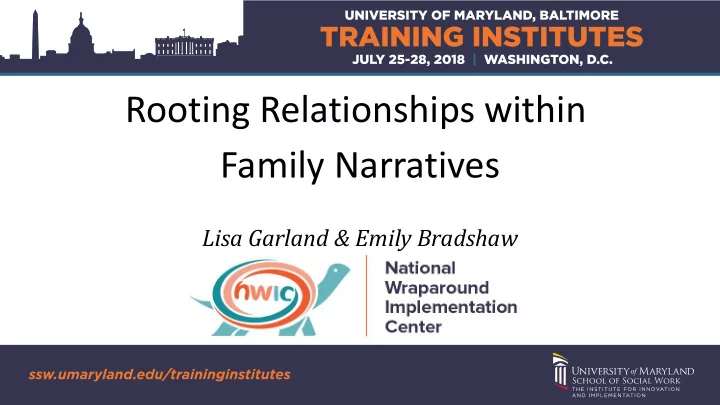

Rooting Relationships within Family Narratives Lisa Garland & Emily Bradshaw
Objectives • Participants will consider new opportunities to recognize relationships within the lives of those whom we partner in our practice. • Participants will learn the importance of weaving relationships and multiple perspectives into the family’s narrative. • Participants will practice new skills to explore these important connections crucial to the sustainability of positive outcomes.
Impact of Human Services on Connections 5% More Intense Full Wrap complex Intervention Process needs Level Targeted Individualized 15% Intervention Services Level Universal Health General Promotion Services 80% Level Less complex needs
“A deep sense of love and belonging is an irresistible need of all people. We are biologically, cognitively, physically, and spiritually wired to love, to be loved, and to belong. When those needs are not met, we don't function as we were meant to. We break. We fall apart. We numb. We ache. We hurt others. We get sick.” We are profoundly social creatures. --Brene Brown, Professor at the University of Houston Graduate College of Social Work
The Missing Piece
Relationships & Well-Being • Research shows that genes impacted by social connection also code for immune function and inflammation, helps us recover from disease faster, and may even lengthen our life. • People who feel more connected to others have lower rates of anxiety and depression. • Social connectedness generates a positive feedback loop of social, emotional and physical well-being.
Gathering a Wide Family Story Explores relationships that have helped the family bounce back during tough times and celebrate through the good times Gets an understanding of the family’s significant events and patterns starting with the caregivers birth Highlights coping skills, resources, supports and aspects of family culture used to manage behaviors and challenges as well as exceptions and times when things have gone well.
Partnership to Uncover the story • True partnership is impossible without mutual respect • Everyone needs to be heard and understood before solutions can be sought • Everyone has strengths • Judgements can wait • Partners share power • Partnership requires intention and attention 9
Pathways to Listening • Stop Talking • Be prepared to listen • Be approachable • Listen with your eyes and ears • Use reflections • Be patient, let it happen
The family is the expert on their story
Creating a strong family story lets us know we are connected to something bigger than ourselves. It is understanding both the positive moments as well as a family’s ability to bounce back from the difficult ones that create resiliency.
Let’s Practice
Factors to Consider When Developing a Family Story • Do you understand the authentic relationships that impact the family’s story? • Do you have an understanding of the current behaviors and challenges in the context of the family’s culture? • Have you created a shared understanding of the family’s experience that others can relate to and generate empathy? • Can you empower the family and supports to feel hopeful about the future?
How do we restore relationships while providing needed interventions?
What else?
“Words are how we think; stories are how we link.” - Christina Baldwin
References Cottam, H. (2015, October). Social Services Are Broken. How We Can Fix Them [Video file]. Retrieved from https://www.ted.com/talks/hilary_cottam_social_services_are_broken_how_we_can_fix_them Feiler, B. (2013, March 13). The Stories that Bind Us. New York Times, Retrieved from http://www.nytimes.com/2013/03/17/fashion/the-family-stories-that-bind-us-this-life.html?_r=0 McPherson, M., Lovin-Smith, L., Brashears, M. (2006). Social Isolation in America: Changes in Core Discussion Networks over Two Decades. American Sociological Review (71), 353-375. https://doi.org/10.1177/000312240607100301 Pires, S.A. “Primer Hands On”: Skill Building in Systems of Care Seppala, E. ( 2012, August 26). Connect to Thrive. Psychology Today, Retrieved from https://www.psychologytoday.com/us/blog/feeling-it/201208/connect-thrive
Resources • The Institute for Innovation and Implementation • http://ssw.umaryland.edu/theinstitute • National Wraparound Implementation Center (NWIC) • www.NWIC.org • National Wraparound Initiative • http://www.nwi.pdx.edu • Family Narratives Lab-Emory University Dept. of Psychology • http://www.psychology.emory.edu/cognition/fivush/lab/FivushLabWebsite/index.html • Wraparound resources • www.paperboat.com • http://www.milwaukeecounty.org/WraparoundMilwaukee7851.htm
Contact Information National Wraparound Implementation Center (NWIC) www.nwic.org Email: nwic@ssw.umaryland.edu The Institute for Innovation and Implementation University of Maryland, School of Social Work 525 W. Redwood St Baltimore, MD 21201-1023 Email: theinstitute@ssw.umaryland.edu Website: www.ssw.umaryland.edu/theinstitute
Recommend
More recommend